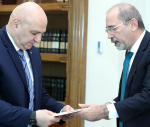You are here
Fatwa needed to clarify status of Niqab
May 12,2019 - Last updated at May 12,2019
Sri Lanka has taken several additional security measures in the aftermath of the Easter Sunday attacks on churches and hotels that killed 258 people and injured nearly 500 others. Among these new measures is forbidding the wearing of the Niqab face veil by women.
The authorities in the country came to the conclusion that wearing of the Niqab raises several additional security risks to countries, Muslim and non-Muslim alike, since it conceals the identity of people and ends up posing grave security risks to peoples and countries equally.
Muslims across the Muslim countries have yet to decide whether wearing the Niqab has well-founded Islamic tradition, as women in the days of Prophet Mohammad joined men in battle against the enemies of Islam and were very active politically and economically in their society.
Many Muslims maintain that wearing the Niqab was never an established Islamic tradition in the era of Prophet Mohammad, and they continue to submit that while wearing the hijab was a well-founded Islamic custom, concealing the face completely for friend and enemy alike is not.
What Sri Lanka has decided on warrants a follow up by other Islamic nations, especially in an era when security concerns are on the rise. Surely, the minority Muslim women who wear the Niqab would understand and appreciate the decisions of Sri Lanka, and, indeed, other countries Muslim and non-Muslim alike, to forbid its wearing for imminent security reasons.
Jordan may not want to consider a similar move in that direction, even though the threats of terrorism are on the rise rather on the decline, until there is an overwhelming Islamic verdict that it is not necessary from a strict Islamic code to wear it.
Perhaps a fatwa from religious leaders on this issue would clarify the status of the Niqab in Islam before the government may outlaw the wearing of this cover on the face of Muslim women for security reasons.
Our own security people have apprehended even men wearing the Niqab to hide their identity in order to commit theft and other criminal offences, a phenomenon that encourages revisiting this issue as a matter of high priority.
Only a small minority of women in Jordan wear the Niqab, but even this minority have a right to ask for a fatwa (religious edict) on the issue before they may decide to stop wearing it. The majority of Muslim women who do not wear the Niqab have a stake in this matter and would very much appreciate an Islamic ruling on it.












